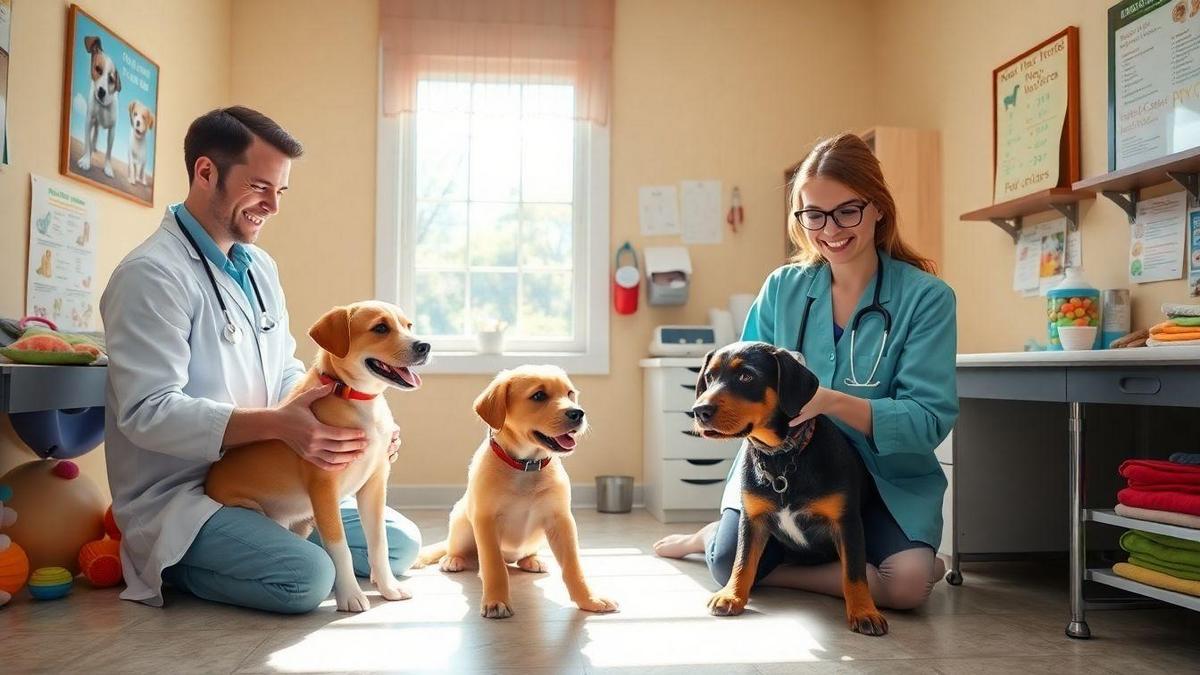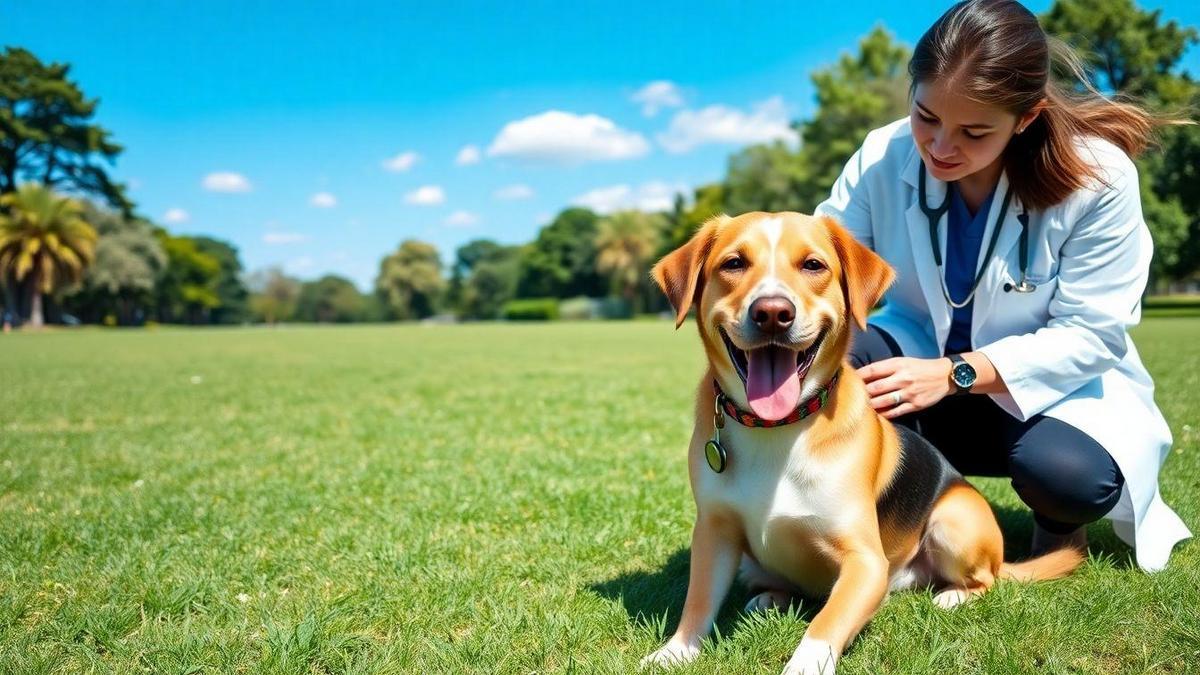The Importance of Regular Vet Visits for Puppies and Senior Dogs
In this article we explore The Importance of Regular Vet Visits for Puppies and Senior Dogs and how routine check-ups help keep our furry friends healthy. We cover what happens during a health check, vaccination schedules, early warning signs, nutrition, dental care, parasite prevention, mobility support, behavior, and visit frequency — all aimed at helping dogs live longer, happier lives. For practical guides on managing age-related conditions, consult resources like common health issues in senior dogs and how to manage them.
Key Takeaways
- Regular vet visits keep dogs healthy and catch problems early.
- Vaccines prevent serious diseases.
- Early detection improves outcomes.
- Dental care preserves comfort and quality of life.
- Ongoing vet relationships enable tailored care.

What a standard dog health check includes
A typical health check covers several key areas:
- Physical exam: Eyes, ears, teeth, coat, skin, and general condition.
- Weight check / Body Condition Score (BCS): Ensures healthy weight.
- Vaccinations: Update core and risk-based vaccines — see a helpful overview of vaccines for dogs.
- Parasite control: Fleas, ticks, worms; prevention advice such as those described in how to protect your dog from fleas and ticks naturally.
- Blood/urine tests: Detect hidden issues early.
How vet consultations guide your care plan
Each visit helps create a personalized care plan. Vets tailor advice by life stage:
- Puppies: focus on socialization, training, vaccinations, parasite prevention — resources like socializing your dog: why it matters and the puppy vaccination schedule are useful.
- Senior dogs: focus on pain management, screening tests, diet adjustments, mobility support — see tips on helping your senior dog stay active and healthy.
An ongoing relationship with your vet builds confidence and keeps care consistent.
Simple pre-visit notes to bring
Make the most of appointments by preparing:
- Behavior changes: Appetite, energy, bathroom habits.
- Diet: Food type and amounts.
- Medications: Names, doses, schedule.
- Questions: Written list so nothing’s forgotten.
Vaccination schedules for puppies and senior dogs
Core vaccinations for young puppies
When a puppy joins the family, core vaccines protect against life-threatening diseases. For a detailed timetable and explanations, consult the puppy vaccination schedule guide.
| Vaccine | Age to Start | Booster Schedule |
|---|---|---|
| Distemper | 6–8 weeks | Every 3–4 weeks until 16 weeks |
| Parvovirus | 6–8 weeks | Every 3–4 weeks until 16 weeks |
| Adenovirus | 6–8 weeks | Every 3–4 weeks until 16 weeks |
| Rabies | 12–16 weeks | 1 year after initial dose, then every 1–3 years |
Keep the full series to ensure strong immunity.
Boosters and vaccine choices for older dogs
Senior dogs need boosters and risk-based vaccines.
| Vaccine | Recommended Age | Booster Schedule |
|---|---|---|
| Distemper | ~7 years | Every 3 years |
| Parvovirus | ~7 years | Every 3 years |
| Rabies | ~7 years | Every 1–3 years |
| Bordetella | As needed | Annually (if at risk) |
For background on vaccine types and decision-making, review understanding vaccines for dogs.
How to keep clear vaccine records
- Create a medical folder for each pet.
- Mark dates on a calendar or phone reminders.
- Request updated records at each visit.
Early detection: why acting quickly matters
Early detection often changes outcomes. Regular screening and watching early signs lets you treat issues before they worsen — many owners find the checklist in 7 common dog health problems and how to prevent them helpful.
Routine screening tests vets use for seniors
| Test | Purpose |
|---|---|
| Blood tests | Check organ function, metabolic issues |
| Urinalysis | Detect infections, kidney problems |
| X-rays | Assess bones, joints, chest |
| Heartworm test | Ensure protection from heartworm disease |
For age-related health planning, see common health issues in senior dogs.
Early warning signs in puppies
Watch for:
- Lethargy, loss of appetite
- Vomiting or diarrhea
- Persistent coughing or sneezing
Early puppy days are critical — the first 30 days with your puppy covers many initial concerns.
Tests to request for early detection
- Complete blood count (CBC)
- Fecal examination (parasites)
- Heart checks (ECG/ultrasound) when indicated
Dental health checks and care
Dental health affects overall well-being; routine exams identify issues before they become painful.
Common oral problems in older dogs
| Oral Problem | Description |
|---|---|
| Periodontal disease | Gum infection leading to pain and tooth loss |
| Tooth decay | Cavities and damaged teeth |
| Bad breath | Often plaque or infection |
| Oral tumors | Lumps or growths in the mouth |
Puppy dental care tips vets recommend
- Start early with gentle tooth handling and brushing.
- Use puppy-safe toothpaste (no human paste).
- Provide safe chew toys to help reduce plaque.
Daily home dental steps
- Brush teeth several times a week — guidance is available at how often should you really brush your dog’s teeth.
- Offer dental chews to reduce plaque.
- Keep fresh water available.
Nutrition and weight checks: managing life stages
Vets assess body condition (BCS 1–9; ideal 4–5) by feeling ribs, looking for a waist, and noting overall shape. For senior-specific dietary guidance, see nutrition tips for senior dogs with special needs.
| Dog Age Stage | Suggested Diet Changes |
|---|---|
| Puppies | High protein, higher fat for growth |
| Adults | Balanced diet, moderate fat |
| Seniors | Lower calories, joint-support nutrients |
Useful articles on choosing diets and portion control include the best diet for your dog’s age and activity level and how to keep your dog at a healthy weight.
Weight-tracking habits at home
- Monthly weigh-ins.
- Measure portions to avoid overfeeding.
- Keep a journal of eating and activity changes.
Parasite prevention and regular checkups
Parasites like heartworm, fleas, and ticks can cause serious illness. Prevention keeps pets and homes safe — learn natural and product-based approaches in how to protect your dog from fleas and ticks naturally.
How vets choose parasite prevention
Vets tailor plans based on:
- Age and weight
- Lifestyle (outdoor vs. indoor)
- Geographic risk and prior history
Typical questions vets ask:
- How active is your dog?
- Does your dog visit wooded or high-risk areas?
Parasite prevention schedule
| Task | Frequency | Reminder |
|---|---|---|
| Heartworm prevention | Monthly | Phone alert |
| Flea & tick prevention | Every 1–3 months (product-dependent) | Seasonal checks |
| Annual vet checkup | Once a year | Schedule in calendar |
Mobility, arthritis, and pain care for senior dogs
Arthritis is common in aging dogs but manageable with proper care. For practical adaptations and long-term strategies, read how to make life easier for a dog with mobility issues and how to help your senior dog stay active and healthy.
Diagnosing arthritis and joint issues
Vets use:
- History and physical exam (limping, stiffness)
- X-rays to confirm joint changes
Pain management and rehab options
| Treatment Option | Description |
|---|---|
| Anti-inflammatory meds | Reduce pain and swelling |
| Joint supplements | Glucosamine, omega-3s for long-term support |
| Physical therapy | Strengthen muscles and improve mobility |
| Hydrotherapy | Low-impact exercise that helps joints |
Home changes to keep them comfortable
- Supportive bedding
- Non-slip rugs on slick floors
- Ramps for cars or furniture
- Warm blankets for joint comfort
Behavior and socialization checks
Behavior is part of overall health. Vets assess social milestones and behavior changes; for step-by-step socialization advice see socializing your dog.
Puppy socialization milestones
| Age Range | Socialization Focus |
|---|---|
| 3–5 weeks | Gentle handling, meeting people |
| 6–8 weeks | Interacting with other puppies |
| 9–12 weeks | Exposure to different environments |
| 13–14 weeks | Continued social experiences |
Additional practical puppy-start resources include the first 30 days with your puppy and how to introduce your puppy to other pets.
Behavior changes in seniors to report
Alert your vet if you see:
- Changes in appetite
- Increased sleeping or lethargy
- Anxiety, hiding, or sudden aggression
If behavior issues persist, veterinarians often recommend trainers or behaviorists and may refer you to resources on positive reinforcement training or strategies for separation anxiety.
When to request trainer or behavior referrals
If socialization or behavior issues persist, ask your vet for trusted trainer or behaviorist referrals — professional help speeds progress and reduces stress.
How often to schedule veterinary visits by age and risk
Puppy visit timeline (first year)
| Age | Recommended Visits |
|---|---|
| 6–8 weeks | Initial vaccinations, exam |
| 12 weeks | Second vaccination round |
| 16 weeks | Final puppy vaccines, microchipping — see the puppy vaccination schedule for timing |
| 6 months | Spay/neuter consult (if applicable) |
| 1 year | Annual check-up and adult vaccine plan |
You may also find guides like how to prepare your home for a new puppy and crate training made easy helpful during the first year.
Recommended senior visit frequency and tests
| Age | Visits & Tests |
|---|---|
| 7–10 years | Semi-annual check-ups, blood work, dental exams |
| 10 years | Bi-annual check-ups, comprehensive blood tests, X-rays as needed |
For a deeper look at senior care and testing cadence, refer to common senior dog health issues and management.
Planning reminders and what to bring
- Vaccination records
- List of questions and observations
- Health history notes
- Comfort item (toy or blanket)
Why the Importance of Regular Vet Visits for Puppies and Senior Dogs matters
Understanding The Importance of Regular Vet Visits for Puppies and Senior Dogs means recognizing that prevention, early detection, and tailored care reduce suffering and veterinary costs over time. Routine visits support vaccination, parasite control, nutrition, dental health, mobility, and behavior — all essential for long-term quality of life. For more on preventing common problems, see 7 common dog health problems and how to prevent them.
Conclusion
Regular vet visits are more than routine — they are the foundation of long, healthy lives for both puppies and senior dogs. By prioritizing check-ups, vaccinations, screenings, dental care, and personalized plans, you strengthen the bond with your pet and give them the best chance at a comfortable, active life. Remember the phrase: The Importance of Regular Vet Visits for Puppies and Senior Dogs — make those appointments a priority.
If you’d like more tips, visit Redeversatil for additional pet care articles such as common health issues in senior dogs and how to manage them.
Frequently Asked Questions
Why are regular vet visits important for dogs?
Regular vet visits enable early detection, keep vaccinations current, and provide tailored advice on diet, behavior, and preventive care — all of which help prevent and manage common conditions outlined in common dog health problem guides.
What are the benefits of vet visits for puppies and senior dogs?
Puppies get vaccination series, socialization and growth checks. Senior dogs receive screenings, pain management, and nutrition adjustments — see resources on puppy vaccination schedules and keeping senior dogs active.
How often should we take our dogs to the vet?
At least once a year for healthy adults; puppies need multiple visits in their first year; senior dogs should be seen twice a year or as recommended based on risk and health status.
What can we expect during a vet visit?
Expect a physical exam, weight/BCS assessment, vaccine updates if due, discussion of behavior and diet, and any recommended tests. For prep tips and puppy-first-steps, review the first 30 days with your puppy.
